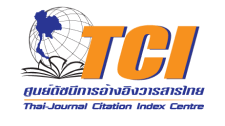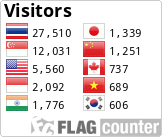About This Journal
Aims and Scope
Asian Medical Journal and Alternative Medicine (AMJAM), previously known as Thammasat Medical Journal, is an international, peer-reviewed, open-access journal that reports on all aspects of medical sciences and alternative medicine. The journal dedicates to the dissemination of timely, accurate and reliable knowledge to its readers and provides a platform for academic dialogue in English language, adhering to international standard protocols and ethical editorial practices with no publication charges.
Our mission is to promote new, novel and innovative works in medical sciences and alternative medicine. The journal especially highlights research conducted in Thailand, Southeast Asian and Asian countries but also welcomes submitted works from around the world related to its academic fields. Our intended readership and contributors include researcher, academic and healthcare professionals working in the fields of medical sciences and alternative medicine.
AMJAM welcomes research, insights, and studies that contribute to the knowledge and advancement of medical sciences involving topics related to patient care and clinical innovations to improve patient outcomes and healthcare systems. AMJAM covers diverse medical disciplines, including medical specialties to facilitate interdisciplinary collaboration and knowledge exchange to the broader field of healthcare and enhance healthcare practices for the wider community. The journal scopes of content are as follow:
- Medical specialties, focusing on clinical studies involving epidemiology, investigation, diagnosis, treatment, and clinical innovation in patient care and interesting case reports
- Preclinical Sciences, focusing on in-vitro studies and innovations for clinical applications of health-related fields including cell biology, pharmacology, pathology, and microbiology
- Traditional and Alternative Medicine including in-vitro and clinical studies related to Thai and Asian traditional medicine, medicinal plants, herbal medicine, and natural product
- Other areas of health sciences including medical education and artificial intelligence in health sciences, focusing on innovations and applications for medical education and patient care
Peer Review Process
All submitted manuscripts undergo a rigorous double-blind review by three reviewers. The full details of the peer review process can be found in the Peer Review Process.
Publication Frequency
Three times per year Issue 1: January to April Issue 2: May to August Issue 3: September to December
Types of Articles
Original Article: An original article represents a comprehensive research report on specific findings or significant issues within the journal related fields. Each article must present a clear research question or hypothesis, detailed methodology, analysis and interpretation of results, discussion and conclusions, contributing original knowledge to the discipline and influencing further research and practical applications.
Review Article: A review article is a scholarly publication that summarizes and analyzes existing research on a specific topic. It synthesizes findings from various sources, critically assesses the state of the field, and may provide insights into emerging trends and areas of debate.
Case Report: A case report is a detailed account of a patient's presentation, symptoms, diagnosis, treatment, and follow-up. This report illustrates challenging diagnoses due to disease rarity, uncommon presentations, or novel treatment approaches and underscores the importance of personalized approaches to patient care and serves as educational resources.
Brief Research: A brief research is a concise report that highlights potentially significant or important development in research and is suitable for the presentation of research that extends previously published research, including the reporting of additional data and confirmatory results in other settings, as well as small-scale studies, preliminary results, innovative methodologies, or novel tool developments.
Special Article: A special article is a scholarly publication invited by the editors of the journal. It reports on, provides insights, comments or opinions, or summarizes and analyzes existing research on a specific topic of interests among editors and readers of the journal.
Editorial: An editorial article provides an opinion or a view of a member of the editorial board on a specific topic of interest or expertise. It may or may not be relevant to the articles published in the same issue of the journal.
Letter to the Editor: A letter to the editor is a concise communication that offers readers the opportunity to express their opinions or provide insights on previously published articles. It should ideally be based on knowledge contemporaneous with the original article, rather than subsequent scientific developments.
Language
The journal mandates that all articles must be composed in the English language, focusing on subjects within its scope and adhering to academic writing standards. Authors are strongly encouraged to use clear, concise language, and to adhere to proper grammar.
Publication Fees
There is no article processing charge for any publication in AMJAM.
Open Access Policy
The journal is committed to promoting the widespread dissemination and accessibility of articles. We provide open access to our content, allowing readers to access and download articles online with no cost.
Ownership and Management
Asian Medical Journal and Alternative Medicine (AMJAM) is owned and supported by the Faculty of Medicine, Thammasat University. The journal refrains from marketing and advertising.
Publisher
The Faculty of Medicine, Thammasat University is responsible for preparing and publishing: Asian Medical Journal and Alternative Medicine (AMJAM) Research Administration Office, Faculty of Medicine, Thammasat University 99/209 Moo 18 Paholyothin Road, Klong Luang, Pathum Thani 12120, Thailand Tel. +66 2564 4444 ext. 7530, 7532 Fax. +66 2926 9704
Copyright and Licensing
AMJAMis an open access journal. Authors who publish in AMJAM transfer the copyrights to the publisher. AMJAM articles are published under a CC BY-NC-ND 4.0 license (Attribution-NonCommercial-NoDerivatives 4.0). This license allows others to download articles and share them with others as long as they provide credit, but they can't change them in any way or use them commercially.
Revenue Resources
The Faculty of Medicine, Thammasat University fully supports the journal production process, ensuring high publication standards through rigorous peer-review. However, this funding does not influence the editorial board's decisions on reviewing or publishing articles.
Advertising
At AMJAM, we recognize the importance of responsible and ethical advertising to maintain the integrity and quality of our publication. Our advertising policy reflects our commitment to uphold the highest standards of editorial independence, scientific rigor, and ethical principles. The following guidelines outline the criteria for accepting advertisements within our journal:
- Advertisements submitted to AMJAM must adhere to the highest ethical standards. They should not promote or endorse any products, services, or organizations that are engaged in activities considered unethical, illegal, or harmful to individuals, society, or the environment.
- Advertisements must not contain any false or misleading information and should be factually accurate. Claims made in advertisements should be supported by scientific evidence and reliable sources.
- AMJAM maintains complete editorial independence from commercial influence. Advertisers are not entitled to influence the journal's editorial content, including the selection, review, or prioritization of research articles. The acceptance or rejection of advertising will not affect editorial decisions.
- Advertisements for products, services, or organizations must be relevant to the scientific community and aligned with the interests of our readers. Advertisements should be professionally designed and submitted in accordance with our publication's technical specifications and deadlines. All advertisements are subject to review by our editorial board to ensure compliance with our advertising policy.
- Advertisements related to tobacco, alcohol, firearms, or other controversial or potentially harmful products are not accepted.
- Advertisers must disclose any potential conflicts of interest or financial relationships that could be perceived as affecting the impartiality of the advertisement. This includes financial support for research studies mentioned in the advertisement.
- Advertisements will be clearly distinguished from editorial content through appropriate labeling, placement, and design to ensure transparency for our readers.
- AMJAM reserves the right to reject any advertisement that does not meet our ethical standards, is incompatible with our mission, or is not in the best interest of our readers.
The journal does not accept funding through advertisements as part of its policy. Information related to academic conferences, the journal, or research studies may be shared on the journal's official website and are subject to approval of the publisher, or editors which reserves the right to reject or cancel any advertisement at any time.
Direct Marketing
The journal refrains from direct marketing activities as part of its policy. Calls for papers, promotion of the journal, and related activities are announced through the journal's official website, social media platforms, or those of related organizations, adhering to ethical practices and respecting individual rights.
Journal History
Asian Medical Journal and Alternative Medicine (AMJAM) is formerly known as Thammasat Medical Journal (TMJ). With the vision of making Faculty of Medicine, Thammasat University more publicly visible and recognizable, the project for TMJ was initiated in 1999 by Dr. Kammal Kumar Pawa, the Dean of Faculty of Medicine, Thammasat University at that time. The first issue of TMJ was launched in October 2000 with Professor Kongkiat Kulkantrakorn, M.D. serving as the first Editor-in-Chief and having been in this position for the first 12 years. TMJ had also been earlier supported by Professor Somchai Bovornkitti, M.D. who had helped shaping the journal to meet the international standards.
With its consistency in and the quality of article publication, the journal had been growing and more widely accepted among researchers, academicians and healthcare professionals relevant to its fields and was eventually indexed in Thai Journal Citation Index (TCI). The second Editor-in-Chief was Professor Surasak Buranatrevedh before he handed over this position to the third Editor-in-Chief, Professor Anucha Apisarnthanrak, M.D. With the goal of being included in international citation databases, TMJ underwent a transformation process, evolving into the new journal, AMJAM in 2021. AMJAM has been publishing articles on medical sciences and alternative medicine since then with the ongoing support from Faculty of Medicine, Thammasat University and the new appointment of the fourth Editor-in-Chief, Professor Thana Khawcharoenporn, M.D, M.Sc. in 2024.
Journal Metrics
- This journal is indexed in Thai Citation Index (TCI) AMJAM is recognized for its quality and impact, being indexed in the Thai Citation Index (TCI). Our journal metrics demonstrate the influence of our articles within the academic community, showcasing visibility and engagement with researchers worldwide. We continuously strive to uphold rigorous editorial standards and ensure the dissemination of impactful research that contributes to scientific advancement and innovation.
- Usage: 78 monthly downloads
- Speed/acceptance: 163 days average from submission to first editorial decision 169 days average from editorial acceptance to publication 83.72% acceptance rate
For further details on our indexing and journal metrics, please refer to the Thai Citation Index database or contact us directly.
Digital Archiving
The journal's articles receive Digital Object Identifiers (DOIs) from the CrossRef organization to ensure they can always be found. In addition, the journal is preserved in CLOCKSS and Portico, the two leading preservation archives that guarantee persistent access for the very long term.



